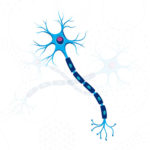To do more for Gwyneth: One family’s journey with Rett syndrome

When Florida couple Melissa and Nick welcomed their daughters, McKinley and Gwyneth, in October 2017, the first-time parents knew to expect the unexpected with parenthood. Nonetheless, they couldn’t help but envision their daughters’ futures: learning to walk, talk, and drive, then eventually going to college, falling in love, getting married, and having kids. And Melissa was excited to think of the bond the girls would share as twins.
Things began to fall apart
The girls were around 8 months old when Melissa and Nick noticed that Gwyneth was having a hard time crawling and keeping up with her sister. The delay was a notable change for Gwyneth, who until that point had been first to reach milestones such as holding up her head, sitting, and babbling. Gwyneth was then noticeably behind McKinley in learning to walk, and once on her feet, she had an uneven gait and would often fall without trying to catch herself.
Their pediatrician insisted nothing was wrong, but Melissa and Nick knew something wasn’t right.
“I finally said, ‘she’s not fine,’” Melissa recalls. “’And I’m not leaving this office until there’s a next step.’”
No stone unturned
Their insistence led to more than a year of appointments with eye doctors, hearing specialists, and other experts. Finally, after being referred to a local neurologist, they were set on a path to answers.
By this time, Gwyneth had begun exhibiting hair-pulling, rhythmic hand movements, and decreased motor skills. Eventually, she reached a point where she stopped being able to feed herself or play with her toys.
“She just became stuck,” Melissa says. “She couldn’t use her hands to do anything anymore.”
“Looking back on it, her decline was fast,” adds Nick. “But at the time, it feels like you’re slow-rolling off a cliff.”
In 2020, the neurologist arranged genetic testing, which quickly provided a diagnosis of Rett syndrome.
Rett syndrome is a rare genetic neurological disorder that occurs in 1 of every 10,000 female births worldwide; it’s even rarer in boys. Rett syndrome affects a child’s ability to speak, walk, eat, and breathe. While it ranges in severity, most children with Rett syndrome require help with every aspect of daily living.
“When you get that kind of news, it’s like someone’s saying to you: Everything you thought was going to happen for your kid? Scratch it,” says Melissa. “We felt like we were being told Gwen would never go to college or get married.”
Getting a team in place
Melissa and Nick contacted Boston Children’s Hospital and were connected with Grace Bazin, a registered nurse with the Rett Syndrome Program.
“It’s refreshing to have someone know what you’re talking about,” Melissa says of her initial conversations with the Rett Program team.
At Boston Children’s, Gwyneth’s care is led by neurologist Dr. David Lieberman. Together with Dr. Lieberman, Bazin, and genetic counselor, Lindsay Swanson, Melissa, Nick, and Gwyneth meet both virtually and in person.
“What’s so great about the team is they’re so accessible,” Melissa says. “If I see anything — alarming or not — I can contact them. They’re honest with me and explain things in a way that makes sense to me.”
“I had expressed that we really want to do as much as we can for Gwyneth,” Melissa adds. “So, I told Grace if there’s a trial or anything [Gwyneth would qualify for], to please, please, please let us know.”
When your child is sick, it’s top of mind all the time to do more for them.
– Gwyneth’s mom, Melissa
Last fall, that opportunity came. Bazin notified Melissa and Nick about a clinical trial studying the effects of the drug trofinetide on girls who are 2-5 with Rett syndrome. Until this time, most trials studying Rett syndrome had been limited to older age groups.
The study is sponsored by Acadia Pharmaceuticals and is being facilitated at Boston Children’s by the Rosamund Stone Zander Translational Neuroscience Center. The Center is dedicated to translating research discoveries into treatment and cures for pediatric nervous system disorders.
“Rett syndrome is incredibly complex, and there’s currently no cure,” Bazin says. “However, this trial is looking at the safety and efficacy of long-term treatment with an oral medication. The hope is to help children with this neurodevelopmental disorder regain motor planning abilities and other functionality.”
Seeing a light
Gwyneth started the trial in December. These days, her parents enjoy seeing her happy and social and playing with her sister in the pool or at the beach. And they’re optimistic about what the future holds and thankful for the care, support, and opportunities they’ve received at Boston Children’s.
“A diagnosis of Rett syndrome is a traumatic event,” Nick says. “It takes a tremendous toll on the family, so it’s important to get the help you need.”
“I’d tell any other parent going through a similar situation to get the right team in place,” Melissa adds. “Surround yourself with people who support you.”
Learn more about the Rett Syndrome Program.
Related Posts :
-

Rett syndrome sees glimmer of hope in Phase I trial
Part 1 of a two-part series. (Read part 2.) In the world of neurodevelopmental disorders, an exciting trend is the emergence of ...
-

New technique yields potential treatment for a common cause of autism
Since 2008, we have known that the 16p11.2 chromosomal region is linked with autism spectrum disorder (ASD). Now, researchers from Boston ...
-

The hidden burden of solitude: How social withdrawal influences the adolescent brain
Adolescence is a period of social reorientation: a shift from a world centered on parents and family to one shaped ...
-

The dopamine reset: Restoring what’s missing in AADC deficiency
In March 2023, a young girl came to Boston Children’s Hospital unable to hold up her head — one striking symptom ...





